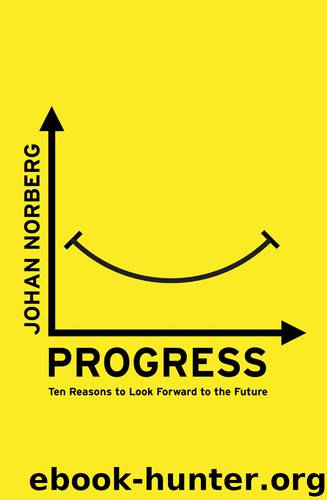Progress by Johan Norberg

Author:Johan Norberg
Language: eng
Format: epub
Publisher: Oneworld Publications
Published: 2016-08-08T16:00:00+00:00
7
Literacy
The mind is not a vessel that needs filling, but wood that needs igniting.
Plutarch1
When Lasse Berg and Stig Karlsson met the poor agricultural worker Bhagant in the Indian village of Saijani in 1977, Bhagant did not know that he lived in India. At first, he thought that the photographer, Karlsson, had a problem with his eye, since he always had to hold a machine to it. His daughters, who were eight and twelve, worked hard in the home, in the fields and with the farm animals. Bhagant was a dalit, and none of the lower castes in his village got an education. They could not follow the news, learn about other places or make themselves heard. Partly as a result, they lived in abject poverty.
As we saw in chapter 4, this story has a happy ending. When Berg went back in 2010, he returned to a literate village. In Bhagant’s generation almost no one got an education; in his children’s generation some got an education (though not his children); in his grandchildren’s generation almost everyone does. People follow news on the internet and walk around with mobile phones, and see themselves as part of a bigger world. They discuss wars on other continents and global prices. Bhagant now owns a tractor, and his grandson uses it to work for bigger farmers. His granddaughter Seema will never work on the land – she is becoming a computer technician.
When I have visited different Indian cities I have always been struck by the frequent sight of large groups of children in uniforms walking to and from school. Since India’s independence in 1947, the literacy rate has increased from twelve to seventy-four per cent – which still gives India the largest illiterate population in the world. The youth literacy rate – literacy among those aged fifteen to twenty-four – is now more than ninety per cent.
Literacy has given a new generation of Indians access to information and a voice in society. It has made it possible for them to pick up new skills and ideas, to get better jobs and to become more independent of big landowners. But Bhagant also has a complaint. With better education, the young don’t know their place. They contradict their parents and complain about their situation. They are not content any more. They want more from life. As Berg points out, ‘Mostly this is about villagers raising their focus from the furrow they ploughed for generations, to start to gaze with curiosity at the world a little further away. They have started to dream.’2
Literacy – the ability to read and write texts – is one of the most important skills, since it is the capacity to acquire even more capacity. It makes it possible to make much greater use of knowledge that others have. This often reduces poverty directly since it makes it possible to pick up skills and ideas that make you more productive and able to use technology better. It is also important in order to be
Download
This site does not store any files on its server. We only index and link to content provided by other sites. Please contact the content providers to delete copyright contents if any and email us, we'll remove relevant links or contents immediately.
Born to Run: by Christopher McDougall(7125)
The Leavers by Lisa Ko(6948)
iGen by Jean M. Twenge(5415)
Sapiens by Yuval Noah Harari(5370)
Spare by Prince Harry The Duke of Sussex(5195)
The Kite Runner by Khaled Hosseini(5178)
Machine Learning at Scale with H2O by Gregory Keys | David Whiting(4313)
Bullshit Jobs by David Graeber(4190)
Never by Ken Follett(3954)
Goodbye Paradise(3810)
Livewired by David Eagleman(3772)
Fairy Tale by Stephen King(3394)
A Dictionary of Sociology by Unknown(3085)
Harry Potter 4 - Harry Potter and The Goblet of Fire by J.K.Rowling(3073)
The Social Psychology of Inequality by Unknown(3029)
The Club by A.L. Brooks(2925)
Will by Will Smith(2919)
0041152001443424520 .pdf by Unknown(2845)
People of the Earth: An Introduction to World Prehistory by Dr. Brian Fagan & Nadia Durrani(2736)
